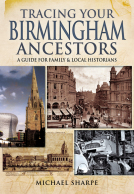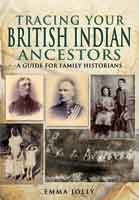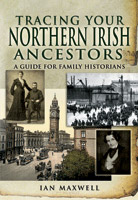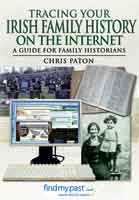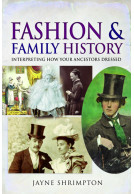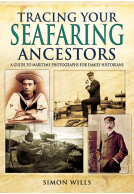Tracing your Ancestors using the UK Historical Timeline (Paperback)
A Guide for Family Historians
Imprint: Pen & Sword Family History
Series: Tracing Your Ancestors
Pages: 168
ISBN: 9781399003322
Published: 25th June 2021
Last Released: 2nd April 2025
(click here for international delivery rates)
Order within the next 6 hours, 37 minutes to get your order processed the next working day!
Need a currency converter? Check XE.com for live rates
| Other formats available | Price |
|---|---|
| Tracing your Ancestors using the… ePub (21.7 MB) Add to Basket | £6.99 |
This handy book is a timeline guide to genealogical resources - what records are available and when they started - as well as an aide-memoire to significant historical events from 1066 to 2020; helping to put family ancestors into an historical context. Each page in this book has a main column with facts of genealogical relevance in the broadest sense; a side column makes mention of events of socio-cultural significance and events relating to the monarchy, the State and the Church. Entries cover historical and genealogical aspects of all four countries of the UK plus Ireland and the Channel Islands, as well as significant historical events in the wider world that had an impact here.
The timeline is especially strong on the contribution of migration, extreme weather, disasters, epidemics, wars, non-conformist religions, taxation, transport, the armed services, famine, empire, organised labour, social writers, mapmakers, political unrest and scientific advances. Genealogically, there is information on changes to BMD certificates and the associated register entries, as well as to censuses and the facts they collected, plus much more. There are also references to earlier records that generated name indexes such as muster rolls and poll taxes, how complete they are and where they can be found. By being reasonably balanced across the centuries, the authors have resisted the temptation to include excessive detail on recent history.
This book will help the family historian to construct a timeline for their ancestors, providing a fairly full set of historical events, developments and records likely to have had an impact on them, their family and community. It is a handy reference guide to a myriad of dates but is also a useful book to study when writing a family history as it offers plenty of contextual information. It should also prompt readers to search out new resources in tracing their ancestors.
"The book is well set out and clearly shows the authors’ knowledge of what is relevant to the family historian."
Transactions of the Halifax Antiquarian Society, 31(2023)
An historical timeline that can be used to give you an understanding of where and when your ancestors ”fit” into UK history. Interesting to read as a stand-alone history book, and a source of reference if you want to quiz others.
NetGalley, Rolf Bachelor
"A huge source of reference."
The Somerset and Dorset FHS
This is an amazingly useful source book spanning the historical events from 1066 until 2020 and each page is divided into two columns –Socio-Cultural, and Monarchy, State and Church and include historical as well as genealogical aspects of all four countries of the United Kingdom plus Ireland and the Channel Islands.
North of Ireland Family History Society
When I first looked at this book, I thought it would be an interesting list of dates and events that would help me to put my research into a historical context. Well it is, but also much more. The authors provide not only a guide to what took place around the lives of our ancestors but also what records are available and where to find them.
Barnsley Family History Journal
The book is easy to use and you can read it from cover to cover or just pick out the dates in which you are interested. It is straightforward and informative, with a good introduction, a list of abbreviations and an easy-to-follow subject index.
This 154 page book includes information from 1066 to 2021 and has not only been invaluable to me in my search for records but has provided an enormous amount of interesting information.
There’s no doubt that timeline guides are useful reference books for local and family historians, for recording developments and records likely to have had an impact on individuals, families and communities. This book demonstrates considerable effort in collecting interesting information which could be relevant and should stimulate readers to search out new resources in tracing their ancestors.
Norfolk Family History Society - 'The Ancestor' magazine
The book is ideal for giving context to your ancestors’ lives and discovering events which could have affected them, and it might prompt further avenues of research. The book is of general interest, too; I enjoyed simply opening a page at random and seeing what gems were revealed.
Family History Society of Cheshire - CHESHIRE ANCESTOR, June 2022
Smith & Bertram have managed to make what is basically a reference book into a thoroughly enjoyable read. By dipping in and out you can glean information and facts which can be incorporated into your family history narrative when writing up your family story. A useful addition to any family historian’s bookshelf.
Family and Community Historical Research Society Newsletter, Volume 23, February 2022
"I cannot recommend this book highly enough for broadening one’s general knowledge of past events, and for the family researcher it weaves our forbearers into the great tapestry of our history."
Jean Fowlds - Glamorgan FHS
"I would heartily recommend this useful book to help construct a timeline for your family and to point out further resources to investigate."
London Westminster & Middlesex FHS Journal, September 2021
"This is a book that could broaden the family historians research project."
East Yorkshire Family History Society
When I received this book I was unsure what it would contain and how it could help with family history, however I soon found out. Each page is divided into three. Monarch, State and Church; Socio-cultural Timeline. The first section; started in 1066 and continued until 2021. This list gave hundreds of events which changed history and which could have included a member of your family. Some events were good and others not so good but all relevant to family history. These could in many cases be the reason why an ancestor is missing or why he/she moved to another town or even country. For example, in 1819 Singapore became a new trading post. Could a family member have been a sailor, involved in some form of trading or just open to an adventure and travelled to Singapore? Another example: between 1821 and 1832 the Greek War of independence was taking place. This attracted many young men to the cause, including Lord Byron. Could your ancestor have joined them? In 1823 the residency of either a bride or groom in a Parish for them to marry was reduced from four weeks to 15 days. One example: The Marriage Act of 1835 connects to my family. It forbade the marriage of a man to his dead wife's sister. A relative of mine married his sister-in-law in the Scottish Church in Amsterdam to get around this law. They were not the only ones as many couples also ventured abroad to marry. My relatives did in fact re-marry in the UK when it became legal to do so.
Carol Sklinar, The Wakefield Kinsman November 2021
The authors have certainly put a great deal of work into this book, the amount of information included is vast. If you are writing a family history there is certainly something in there that will put meat on the bones of an ancestor, making their story more rounded. Well worth the money for a very interesting reference book.
This is a guide to help researchers put dates into wider historical contexts from 1066 to 2020. It is a selective choice by the authors who have chosen the most important topics for family historians and particularly includes those where there may be traceable records, their location and their earliest dates.
BAFHS Journal No.186 December 2021
The time is divided into three columns of information. The main column shows the major events producing resources for such topics as wars, epidemics, migration, religion, taxation armed services, transport, famines and the Empire. There are also the important matters of Parish Registers, Censuses, land surveys, social legislation.
The other two columns list dates of ‘Monarchy, State and Church’ events, and the ‘Socio-Cultural Timeline’. These reveal a wide range of dates about, inter alia, Kings and Queens, Prime Ministers, Wars and political unrest, the developing and changing roles of churches, extreme weather events, disasters, significant books published, and industrial and commercial revolutions.
Rather than helping you trace your ancestors as the title suggests, this book actually helps you to place the ancestors you know about into the context of their times. For example, one of my grandfathers was born in the year Victoria became Empress of India and his great-grandfather was born in the year of the Ross-shire Sheep Riots! Fascinating stuff with a good index.
If you want a novel and different approach as an aid memoire to family history this is the book for you.
Essex Family Historian - No.175, December 2021
"The book will help the reader to create a time line for their ancestors."
Clwyd FHS
... a valuable addition to family historian's library.
WDYTYA? Magazine, October 2021
Rating: 5 out of 5 stars
NetGalley, Anne Marshall
Tracing Your Ancestors Using the UK Historical Timeline by Angela Smith and Neill Bertram could become an invaluable resource for dating events in the life of your British ancestors. It starts in the early 1000s and stretches to the present day with an extensive index at the back. It cites laws, wars, government activity and so much more that it is not worth it to list them all. In many cases there are resources for further investigation. Not only could it be used for family history, but also as a research tool for a course in history, for example. It is thorough and comprehensive. A better resource cannot be found in one place.
What a fantastic little book that would be a great help to people looking at doing their family history. This book is essentially a timeline guide to genealogical family research, the book records significant historical events in the UK from 1066 to 2020 together with major events taking place in the world that had a significant impact on this country. You also get information about the Monarchy, State and Church. This book has been written and published with your ‘everyday’ person in mind as it easily informs in plainer writing that benefits the ordinary person doing their own family research. This helps the researcher by allowing you to place your family information into the bigger picture and can be of great value to the researcher. While I think this may not be a key point in family research, I do think it can be an important one and can move you along in your research.
UK Historian
Read the full review here
Many of us will find this book a useful reference source, especially if you are writing a book or an article.
Mark Carroll, Waltham Forest FHS
Full of information, with a comprehensive subject index, this book could be a ‘go to’ guide for family historians in the years to come.
Hertfordshire People
This has to be the best research aid I have come across for many years.
Karen Walker, Doncaster & District Family History Society
I have been researching my family history for a long time and am in the process of writing stories about my family based on the facts I have found. Facts on their own do not tell the whole story and I believe it is essential to place any events in their historical context. I have spent countless hours trying to find out what was happening in a place at the time my ancestors moved, joined the army, or changed their occupations but this gem of a book has given me just what I wanted in one place.
The book is fundamentally a timeline guide to genealogical resources, pointing you in the direction of surviving records. It records significant historical events in the UK from 1066 to 2020 on the same page as major events taking place in the world that had a significant impact on the lives of our ancestors. You also get information about the Monarchy, State and Church. This book has been created with family historians in mind as it concentrates on events that could inform your research. Examples include migration, transport, taxation, scientific advances such as vaccines and many more.
You can place your own family members in this timeline and use the information it contains to add historical context. In addition, it may also suggest new leads to follow.
This book will definitely have a permanent place on my bookshelf.
I was intrigued by the title of this book. I think this book has uses beyond family history, but it is invaluable for putting your ancestors into the context of what was happening around them in society. As it covers so many years from 1066 onwards, it can only ever give a tantalising glimpse of the historical things happening in each period, but I could quickly see how I could use this book to add more colour to the bare historical facts in my family history as I write it up for family members.
Amazon Customer, Jayne
For example, one of my most intriguing ancestors was living in London in 1858 and this book says that in that year The Great Stink in London gave rise to the construction of the sewers. This fact gives an idea of the sort of conditions my relative, a railway porter was living in. Another couple in my family married in 1832, a year when a cholera epidemic was raging and just before the abolition of slavery in the British Colonies.
A useful addition to my bookshelf.
Read the full review here
Packed with informative and, at times, surprising facts, the book left me with a real sense of walking through history while, at the same time regularly leaving me to conclude that ‘some things never change’. For those professional genealogists engaged in client research or public speakers wishing to inject aspects of national or social history into their reports or presentations, I suggest that this lovingly crafted publication can provide some creative and stimulating historical context.
Christopher Broom, Alde Valley Suffolk Family History Group
This is without doubt a book that will have pride of place on my bookshelf.
This book offers plenty of insight for geanologists. The timeline is helpful and interesting for anyone who is remotely interested in history. It made me want to go away and do so much more of my own research about various historical events and has made me even more interested in migration and political history.
NetGalley, Lauren Hudspeth
There are two ways in which you can use this book – the most obvious is to put your ancestors' lives into historical context, and that's probably what the authors intended. But for me the best aspect of the book was making discoveries about records, or events, or changes in legislation that are going to help me in my future research.
Lost Cousins
If you have ancestors from the UK you're likely to find this book just as useful as I have – thoroughly recommended!
Read the full review here
Rating: 5 out of 5 stars
NetGalley, Sally Mander
This is a helpful genealogical resource, helpful for anyone interested in tracing their roots. As far as I can tell, every single family line that I've researched came through the UK, either living there for a few generations or using it as a stepping stone to get to the USA, eventually. You can trace your ancestors backward, from yourself and find where your family originated.
The book has a timeline guide from 1066 to 2020, to help you track down those elusive ancestors. Highly recommend it. A wealth of information for a fledgling genealogist or an expert.
I have been trying to piece together my family’s history. This books is going to help me a lot in the upcoming months.
NetGalley, Kara Lance
Rating: 5 out of 5 stars
NetGalley, Alison Bevington
I eagerly look forward to any new Pen and Sword publications as I know how beneficial they have been to my family history research. Even as someone who has been compiling their family tree for a while now I seem to find something of use in every new publication .
This book is different from others I’ve read , as it has listings of years and notable things to have happened then., Although interesting to read anyway I feel it’s more beneficial as a reference guide , helping you to see what was happening at the time our ancestors were alive , helping to flesh out the bones of our family tree.
I’m sure this will be a guide I’ll refer to a lot during my research .
Rating: 5 out of 5 stars
NetGalley, Katherine Hartley
A helpful book for beginners and experts alike. When you begin your genealogy journey it's easy to focus on names and census returns, but the real understanding of our ancestors comes from asking what was happening in the world at the time they lived. What wars they would have been talking about with the neighbours, what inventions they might have witnessed, what great world events shocked and inspired them.
A must-have for anyone who wants to add more depth and emotional context to their research.
This book is a historical timeline if events that happened, based on events that happened in the United Kingdom. The historian can then use these events to judge what year events found while researching family trees happened. The book covers events from the 1100’s to modern times. If you or a student need a historical timeline, handy in one place, you could not go wrong with this book on the bookshelf for many generations to come.
NetGalley, Jeffrey Wells
This is a useful guide to significant historical events in UK history and any corresponding genealogical resources Each page in this book has a main column with facts of genealogical relevance in the broadest sense; a side column makes mention of events of socio-cultural significance and events relating to the monarchy, the State and the Church.
NetGalley, Gill Murgatroyd
The timeline is especially strong on the contribution of migration, extreme weather, disasters, epidemics, wars, non-conformist religions, taxation, transport, the armed services, famine, empire, organised labour, social writers, mapmakers, political unrest and scientific advances.
Mentions of long forgotten incidents (e.g. The Andover Workhouse Scandal) lead to fascinating trips down the Wikipedia rabbit hole!
It includes less well-known incidents, such as a large-scale emigration from Scotland to Ireland in 1695, following a famine in Scotland. This may remove a long existing brick wall, between my known family and the direction DNA testing points.
I am happy to recommend this useful and interesting book to all genealogists.
About Neil Bertram
Neil has worked in publishing, primarily design and editing. He was a London Taxi (Black Cabs) driver for ten years and more recently worked as a researcher and volunteer/events coordinator for Boathouse 4 in Portsmouth Historic Dockyard. Neil gained BA (Hons) in History as a mature student and currently works in adult social care. Angela (Smith) has a degree in Art History and a PhD in Combined Historical Studies (Warburg Institute, London). She spent over a decade teaching for Leicester University and currently lectures for the Arts Society.
Nearly 45 years ago Neil could be found walking to school with Angela. Now both have been reunited through their love of digging up the past.
About Angela Smith
Angela has a degree in Art History and a PhD in Combined Historical Studies (Warburg Institute, London). She spent over a decade teaching for Leicester University and currently lectures for the Arts Society. Neil (Bertram) has worked in publishing, primarily design and editing. He was a London Taxi (Black Cabs) driver for ten years and more recently worked as a researcher and volunteer/events coordinator for Boathouse 4 in Portsmouth Historic Dockyard. Neil gained BA (Hons) in History as a mature student and currently works in adult social care.
Nearly 45 years ago Angela could be found walking to school with Neil. Now both have been reunited through their love of digging up the past.









